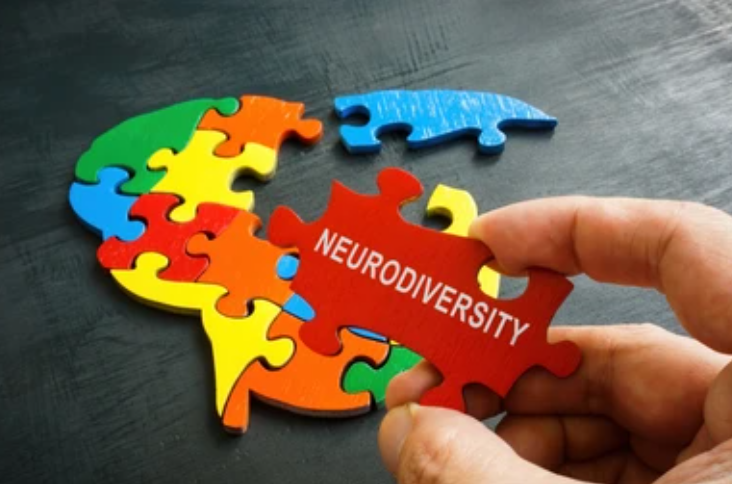Neurodivergence is a concept that sheds light on the wide spectrum of human cognitive functioning. It encompasses the diverse ways in which individuals process information, perceive the world, and interact with their environment. Rather than viewing neurological differences as deviations from a norm, neurodivergence emphasizes the natural variation in human brains.
In recognizing neurodivergence, we acknowledge the richness and complexity of human cognition and behavior. This perspective encourages us to appreciate the unique strengths and challenges that come with different neurological profiles. By understanding and embracing neurodiversity, we can work towards creating more inclusive and accommodating environments where everyone’s abilities and perspectives are valued.
Different Kinds of Neurodivergences & What they Look Like in Individuals
Neurodivergence encompasses a wide range of neurological differences, each with its unique characteristics and manifestations. Some of the most well-known types of neurodivergence include:
Autism Spectrum Disorder (ASD): Autism Spectrum Disorder can manifest uniquely in each individual. Some may struggle with social interactions and communication, finding it difficult to understand social cues or maintain eye contact. Others may exhibit repetitive behaviors or intense focus on specific interests. Sensory sensitivities, difficulty with transitions, and challenges with motor coordination are also common traits. However, the presentation of ASD varies widely, with some individuals displaying mild symptoms while others require more support to navigate daily life.
Attention Deficit Hyperactivity Disorder (ADHD): ADHD commonly involves difficulty with attention, impulsivity, and hyperactivity. Some individuals may struggle to focus on tasks, become easily distracted, or have trouble organizing thoughts and belongings. They might act impulsively without considering consequences or interrupt others frequently. Hyperactivity can manifest as restlessness, fidgeting, or difficulty sitting still. However, ADHD presentations vary, and some individuals may predominantly exhibit symptoms of inattention without hyperactivity.
Dyslexia: Dyslexia is a learning disorder that affects reading and language processing. Individuals with dyslexia may have difficulty with reading fluency, decoding words, and spelling. They might struggle to recognize letters or sounds, leading to slow and inaccurate reading. Despite having normal intelligence, they may find it challenging to comprehend written text, which can impact academic performance and self-esteem. However, with proper support and intervention, individuals with dyslexia can develop strategies to improve their reading and succeed academically.
Dyspraxia (Developmental Coordination Disorder): Dyspraxia, also known as Developmental Coordination Disorder (DCD), affects motor coordination and planning. Individuals with dyspraxia may struggle with everyday tasks that require coordinated movements, such as tying shoelaces, using utensils, or participating in sports. They might appear clumsy, have difficulty with fine motor skills like handwriting, and struggle to organize their thoughts or actions. Despite intelligence being unaffected, dyspraxia can impact academic performance and social interactions. Early intervention and support can help individuals with dyspraxia improve their motor skills and adapt to daily challenges.
Tourette Syndrome: Tourette syndrome is a neurological disorder characterized by involuntary motor and vocal tics. These tics can range from simple, such as eye blinking or throat clearing, to complex, such as jumping or repeating words or phrases. Individuals with Tourette syndrome may experience an urge or sensation before the tic occurs, and tics can vary in frequency and intensity over time. While tics can be disruptive and may draw attention, individuals with Tourette syndrome often lead fulfilling lives with appropriate support and management strategies.
Intellectual Disabilities: Intellectual disabilities are characterized by limitations in intellectual functioning and adaptive behavior. Individuals with intellectual disabilities may have difficulty with learning, problem-solving, and independent living skills. They may exhibit delays in language development, struggle with understanding abstract concepts, and have challenges with memory and reasoning. Adaptive behavior deficits can affect daily activities such as communication, social interaction, and self-care. However, with appropriate support and accommodations, individuals with intellectual disabilities can lead fulfilling lives and make meaningful contributions to their communities.
Specific Learning Disabilities: Specific learning disabilities manifest as difficulties in acquiring and using academic skills despite normal intelligence and adequate instruction. For example, dyslexia involves challenges with reading and language processing, dyscalculia affects mathematical abilities, and dysgraphia impacts writing skills. Individuals with specific learning disabilities may struggle with tasks such as decoding words, understanding mathematical concepts, or expressing thoughts in writing. Despite these challenges, they often have strengths in other areas and can thrive with appropriate support and interventions tailored to their needs.
Sensory Processing Disorder (SPD): Sensory Processing Disorder (SPD) involves atypical responses to sensory stimuli, which can manifest in various ways. Individuals with SPD may be hypersensitive or hyposensitive to sensory input, leading to discomfort or difficulties in processing sensory information. They may exhibit heightened reactions to sounds, lights, textures, tastes, or smells, resulting in sensory overload or sensory-seeking behaviors. Everyday environments may feel overwhelming, leading to anxiety, meltdowns, or withdrawal. Understanding and accommodating sensory needs can greatly improve the quality of life for individuals with SPD.
Disclaimer: Even though this is not an official diagnosis, it is something that is becoming more widely recognized and understood:
Highly Sensitive Person (HSP): This a personality trait characterized by heightened sensitivity to external stimuli. Individuals who identify as HSP tend to process sensory information more deeply and intensely than others, which can manifest in various ways such as being particularly affected by loud noises, strong smells, or bright lights. They may also have a heightened emotional sensitivity, being more attuned to subtle changes in their environment or in the moods of others. HSPs often experience rich inner lives, deep empathy, and may feel overwhelmed or overstimulated in certain situations where others might not be. This trait is not a disorder but rather a normal variation of human temperament
It’s important to recognize that these categories are not mutually exclusive, and many individuals may have overlapped or co-occurring neurodivergent traits. Additionally, neurodivergence exists on a spectrum, and individuals may experience these differences to varying degrees of severity.
Can Neurodivergence Have an Influence on the Mind, Body, and Soul?
Neurodivergence can indeed have an impact on the mind, body, and soul of individuals, although the extent of this impact can vary widely depending on the specific neurodivergent condition and the individual’s experiences and circumstances.
Mind: Neurodivergent conditions often involve differences in cognitive functioning, perception, and information processing. This can affect various aspects of the mind, including attention, memory, executive functioning, and social cognition. Individuals with neurodivergent conditions may experience challenges in areas such as learning, communication, problem-solving, and emotional regulation. However, they may also possess unique strengths and abilities in other areas, leading to a diverse range of cognitive profiles and experiences.
Body: Some neurodivergent conditions can have physical manifestations or co-occurring health issues that affect the body. For example, individuals with autism spectrum disorder (ASD) may have sensory sensitivities or motor coordination difficulties, while those with Tourette syndrome may experience involuntary motor and vocal tics. Additionally, co-occurring conditions such as ADHD or anxiety disorders may impact sleep, appetite, and overall physical health.
Soul/Spirituality: The impact of neurodivergence on the soul or spirituality is more subjective and individualized. Some neurodivergent individuals may experience spiritual or existential questions, seeking meaning and connection in ways that are unique to their neurology and life experiences. Others may find solace and strength in their spiritual beliefs or practices, while some may struggle with feelings of alienation or disconnection. Ultimately, the relationship between neurodivergence and spirituality is complex and multifaceted, influenced by personal beliefs, cultural factors, and individual experiences.
Overall, neurodivergence can have a profound and multifaceted impact on the
mind, body, and soul of individuals. Understanding and addressing the diverse needs and experiences of neurodivergent individuals requires a holistic approach that considers the interconnectedness of these dimensions and promotes support, acceptance, and inclusion in all aspects of life.
What are Neurotypical Settings?
Neurotypical settings refer to environments, such as schools, workplaces, or social gatherings, that are primarily designed to accommodate individuals who are neurotypical. In neurotypical settings, the structures, expectations, and communication styles often cater to the needs and preferences of individuals who process information and interact with others in ways considered typical or mainstream. These settings may prioritize verbal communication, social norms, and sensory environments that are comfortable for neurotypical individuals.
However, it’s important to recognize that neurotypical settings may not always be inclusive or accommodating to individuals who are neurodivergent. The structures and expectations in these settings may unintentionally create barriers for neurodivergent individuals, making it challenging for them to fully participate or thrive.
As awareness of neurodiversity grows, there is increasing recognition of the need to create more inclusive environments that accommodate the diverse needs and preferences of all individuals, regardless of their neurology. This includes adapting structures, communication styles, and support systems to be more inclusive of neurodivergent individuals in various settings, promoting equal opportunities and access for all.
A Holistic Approach to Supporting Individuals with Neurodivergence
The holistic approach to neurodivergence recognizes that individuals are complex beings with interconnected dimensions of well-being, encompassing the mind, body, and spirit. It emphasizes addressing the diverse needs and experiences of neurodivergent individuals through a comprehensive and integrated framework. Here’s how the holistic approach to neurodivergence can be applied:
Mind: Focus on supporting cognitive functioning, emotional regulation, and social cognition. This may involve providing individualized accommodations and interventions to address learning differences, sensory sensitivities
, and challenges in communication and social interaction. Promote strengths-based approaches that emphasize the unique abilities and talents of neurodivergent individuals, fostering a sense of confidence, competence, and self-efficacy.
Body: Attend to the physical well-being and health of neurodivergent individuals. Offer support for managing sensory sensitivities, motor coordination difficulties, and co-occurring health conditions. Encourage regular physical activity, proper nutrition, and adequate sleep to promote overall physical health and vitality. Provide opportunities for sensory integration activities, relaxation techniques, and mindfulness practices to support stress management and emotional well-being.
Spirit: Recognize the spiritual and existential dimensions of neurodivergent individuals’ experiences. Support exploration of meaning, purpose, and connection in ways that resonate with their unique perspectives and beliefs. Offer opportunities for spiritual exploration, expression, and community involvement that honor diversity and promote acceptance and belonging. Foster resilience, hope, and a sense of belonging through meaningful relationships, shared experiences, and supportive networks.
Environment: Create environments that are inclusive, accessible, and supportive of neurodivergent individuals’ needs and preferences. This may involve adapting physical spaces, communication styles, and social norms to accommodate sensory sensitivities, cognitive differences, and diverse ways of interacting and learning. Promote a culture of acceptance, empathy, and understanding that values neurodiversity as a source of strength and richness in human experience.
Collaboration and Advocacy: Foster collaboration and partnership between neurodivergent individuals, caregivers, educators, healthcare professionals, and community stakeholders. Empower neurodivergent individuals to advocate for their needs, rights, and preferences, promoting self-determination and autonomy. Advocate for systemic changes and policy reforms that promote equity, accessibility, and inclusion for neurodivergent individuals in all aspects of society.
By adopting a holistic approach to neurodivergence, we can create supportive and empowering environments that honor the diversity and inherent worth of all individuals, fostering resilience, well-being, and flourishing across the lifespan.
Learn about BYBS Clinician Rochelle Young
Rochelle Young is a therapist whose own diagnosis of ADHD has provided her with valuable insight into the unique challenges and experiences faced by those navigating neurodiversity. Her journey has equipped her with a profound understanding of the complexities of ADHD and a deep empathy for individuals grappling with similar neurodivergent conditions.
Rochelle’s approach to therapy is grounded in a holistic understanding of neurodivergence, recognizing that each individual’s experience is multifaceted and unique. Drawing upon her own lived experience, as well as her professional training and expertise, Rochelle adopts a strengths-based approach that celebrates the diverse talents and abilities of neurodivergent individuals. Rather than focusing solely on deficits or challenges, she empowers her clients to embrace their neurodivergent identity and harness their strengths to navigate life’s complexities.
Central to Rochelle’s therapeutic approach is the cultivation of a safe, supportive, and nonjudgmental space where clients feel heard, understood, and validated. She collaborates closely with her clients to co-create personalized treatment plans tailored to their specific needs, preferences, and goals.
In essence, Rochelle Young is not only a therapist but also a compassionate advocate and ally for individuals navigating the complex terrain of neurodivergence. Through her unique blend of personal experience, clinical expertise, and unwavering dedication, she offers a beacon of hope and support for those journeying towards greater self-understanding, acceptance, and empowerment.
Are you interested in scheduling a free 15-minute consultation with Rochelle Young? Get started today!
Q&A for Neurodivergence
What is Neurodivergence?
Neurodiversity is the concept that neurological differences, such as autism, ADHD, dyslexia, and others, are natural variations of the human brain rather than disorders that need to be fixed or cured.
How does society benefit from embracing neurodiversity?
Embracing neurodiversity promotes inclusion, encourages diverse perspectives, and fosters innovation. Neurodivergent individuals often have unique talents and strengths that can enrich workplaces, communities, and society as a whole.
What challenges do neurodivergent individuals commonly face?
Neurodivergent individuals may face challenges in social interactions, communication, sensory processing, executive function, and navigating environments that are not accommodating to their needs.
How can workplaces support neurodiversity?
Workplaces can support neurodiversity by providing reasonable accommodations, promoting awareness and understanding among staff, offering neurodiversity training, and creating inclusive hiring practices.
What role does education play in supporting neurodiverse students?
Education plays a crucial role in supporting neurodiverse students by providing tailored support, accommodations, and specialized instruction to meet their unique learning needs.
Are there any misconceptions about neurodiversity that should be addressed?
One common misconception is that neurodivergent individuals are all alike or that their differences should be “cured.” It’s essential to recognize and respect the diversity within the neurodivergent community and to understand that neurodiversity is not a flaw but a natural aspect of human variation.
What resources are available for neurodivergent individuals and their families?
We can promote acceptance and celebration of neurodiversity by fostering understanding, empathy, and respect for neurodivergent individuals, advocating for inclusive policies and practices, and amplifying the voices and contributions of the neurodivergent community in all aspects of society.
Alayna Dorfman






